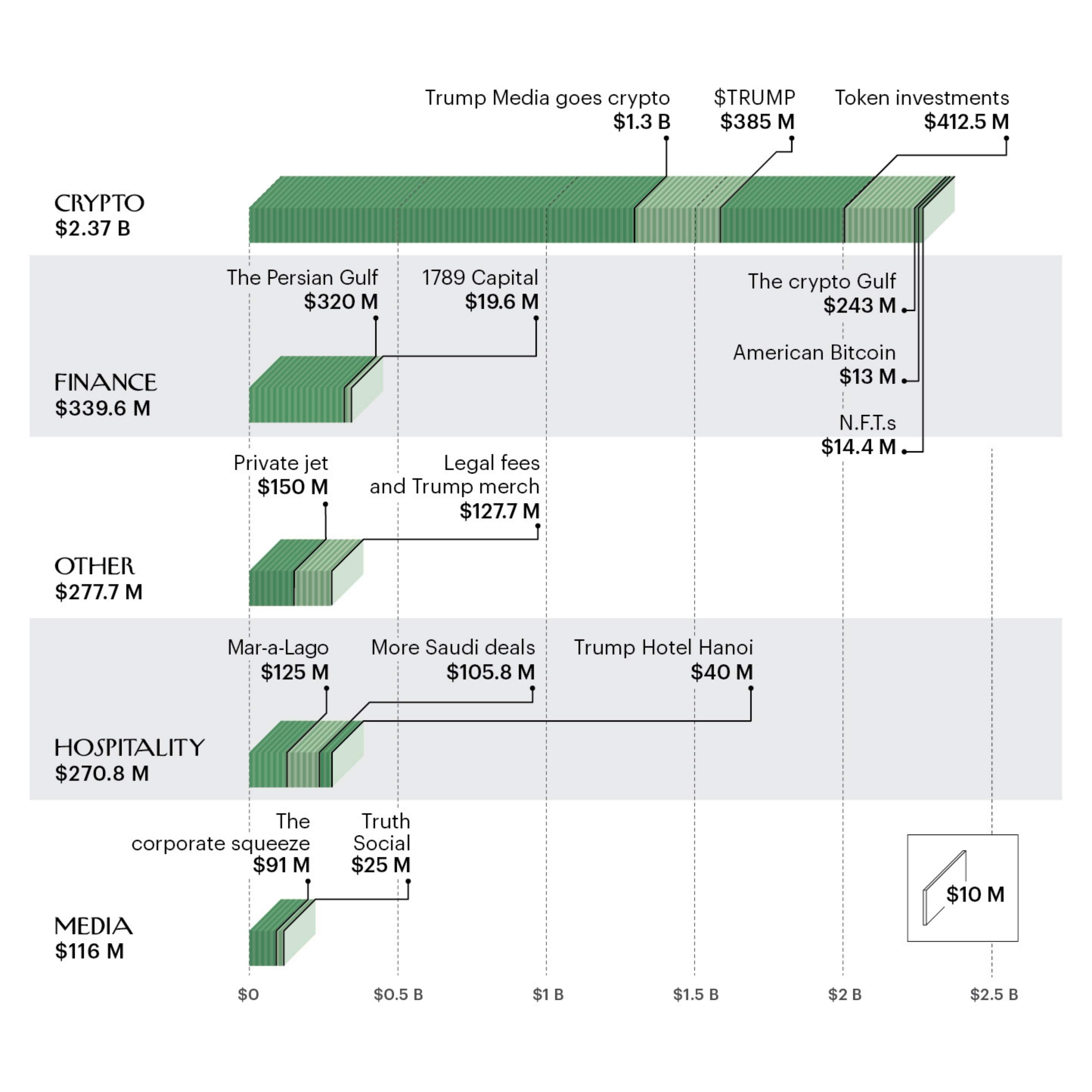Planet Money
Before President Donald Trump’s first term, he was in a “tight spot” financially, according to New Yorker writer David Kirkpatrick. At the start of his second term, David says, Trump was in an “even tighter” spot. But after just six months into his second term, Trump’s financial situation started looking really good.
David has done a full accounting for what the family has been up to, and even using conservative estimates, David says Trump and his family have made almost $4 billion dollars “off of the presidency,” in just about a year.
Today on the show: we look at every new business and business deal and financial transaction that David says likely would not have happened if Trump wasn’t the president of the United States. And we stop at the most innovative ways Trump and his family have made all that.
Pre-order the Planet Money book and get a free gift. / Subscribe to Planet Money+
Listen free: Apple Podcasts, Spotify, the NPR app or anywhere you get podcasts. ??Listen to our playlist on Federal Reserve independence here.
Facebook / Instagram / TikTok / Our weekly Newsletter.
Today’s episode of Planet Money was hosted by Sarah Gonzalez and Mary Childs. It was produced by James Sneed, edited by Jess Jiang, and fact checked by Sierra Juarez. Robert Rodriguez engineered it. Alex Goldmark is our executive producer.
Learn more about sponsor message choices: podcastchoices.com/adchoices

-
How useful, really, are the steps you can take after a data breach?
The dreaded data breach notification… It tells you your personal data’s been compromised and suggests steps you can take to minimize the potential harm. On today’s episode, Kenny Malone pulls out a data breach letter…
-
Why you bought your couch
You probably own a chair or a table or a sofa. And you probably think you know why you bought it. Because it was comfy. Or blue. Or the right price. But what if the…
-
Title Pirates
A couple years ago, Gina Leto, a real estate developer, bought a property with her business partner. The process went like it usually did: Lots of paperwork; a virtual closing. Pretty cut-and-dry. Gina and her…
-
The long view of economics and immigration (Two Indicators)
Mass deportations. What would actually happen—economically—if the President-elect follows through on promises to deport millions of people from America. We don’t have to guess. Today we have two stories from Planet Money’s daily podcast, The…
-
The great German land lottery
Every ten years, a group of German farmers gather in the communal farm fields of the Osing for the Osingverlosung, a ritual dating back centuries. Osing refers to the area. And verlosung means “lottery,” as…
-
The strange way the world’s fastest microchips are made
This is the story behind one of the most valuable — and perhaps, most improbable — technologies humanity has ever created. It’s a breakthrough called extreme ultraviolet lithography, and it’s how the most advanced microchips…
-
What markets bet President Trump will do
On the day after the election, Wall Street responded in a dramatic way. Some stocks went way up, others went way down. By reading those signals — by breaking down what people were buying and…
-
Moving to the American dream? (update)
Back in the 90s, the federal government ran a bold experiment, giving people vouchers to move out of high-poverty neighborhoods into low-poverty ones. They wanted to test if housing policy could be hope – whether…
-
The veteran loan calamity
Ray and Becky Queen live in rural Oklahoma with their kids (and chickens). The Queens were able to buy that home with a VA loan because of Ray’s service in the Army. During COVID, the…
-
So your data was stolen in a data breach
If you… exist in the world, it’s likely that you have gotten a letter or email at some point informing you that your data was stolen. This happened recently to potentially hundreds of millions of…
